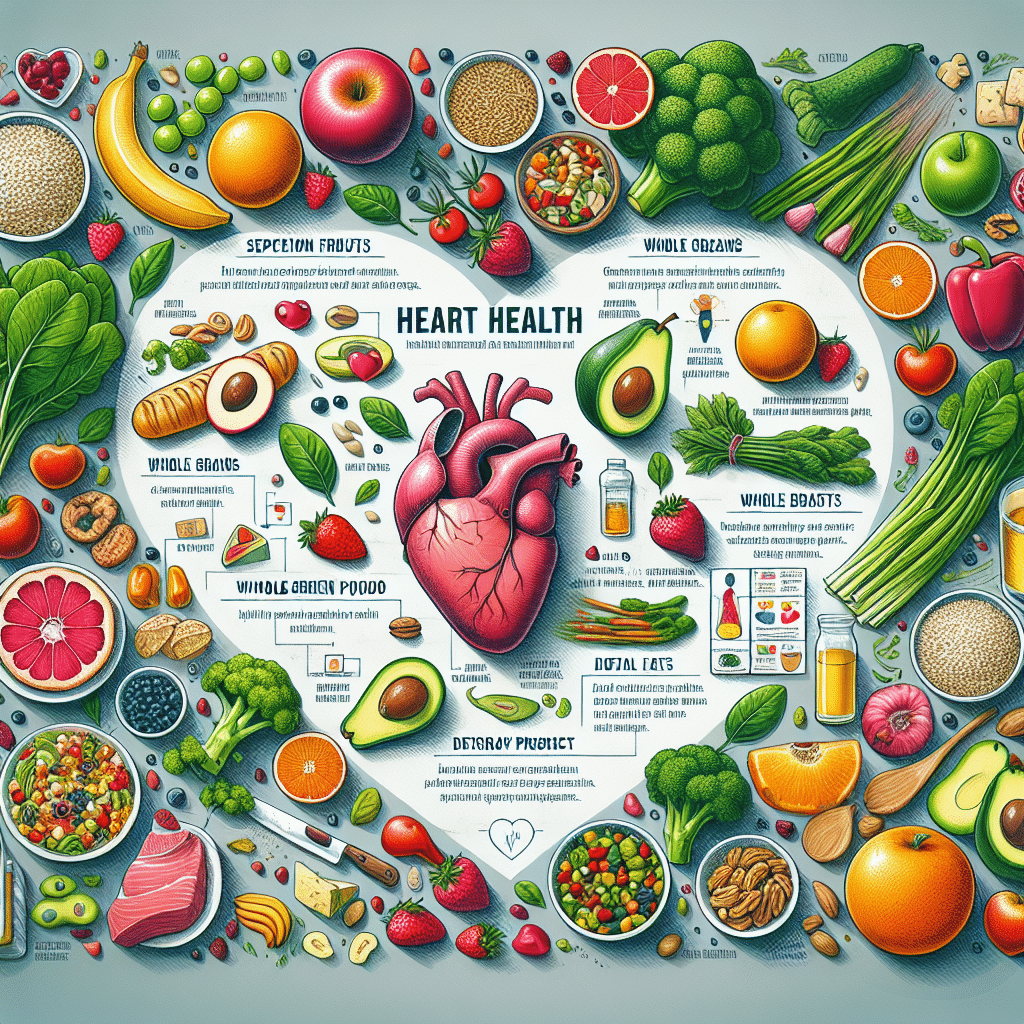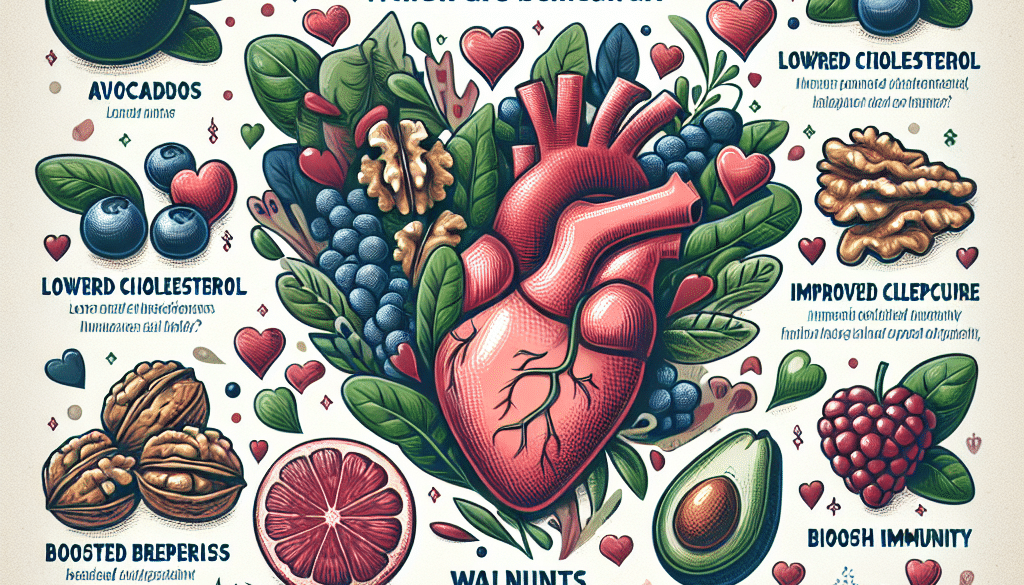Heart Health Food Trends: Which Are Beneficial?
-
Table of Contents
- Heart Health Food Trends: Beneficial or Just Hype?
- The Rise of Plant-Based Diets
- Omega-3 Fatty Acids: A Heart-Healthy Trend
- Whole Grains for Whole Heart Health
- Reducing Added Sugars: Sweet Relief for the Heart
- Functional Foods and Heart Health
- Conclusion: Embracing Heart-Healthy Food Trends
- ETprotein: Enhancing Your Heart-Healthy Diet
Heart Health Food Trends: Beneficial or Just Hype?

Heart health is a major concern for many individuals, and with the rise of cardiovascular diseases, it’s no surprise that food trends claiming to boost heart health are gaining traction. However, amidst the plethora of dietary advice and superfood claims, it’s essential to discern which trends are truly beneficial for our hearts. This article delves into the latest heart health food trends, backed by research, to guide you towards making informed dietary choices.
The Rise of Plant-Based Diets
One of the most significant trends in heart health is the shift towards plant-based diets. A growing body of evidence suggests that diets rich in fruits, vegetables, whole grains, nuts, and seeds can help reduce the risk of heart disease. For instance, the Mediterranean diet, which emphasizes plant-based foods along with healthy fats like olive oil and moderate fish consumption, has been associated with a lower risk of heart-related issues.
- Increased intake of dietary fiber from plant sources can improve cholesterol levels and blood pressure.
- Antioxidants found in fruits and vegetables combat oxidative stress, which is linked to heart disease.
- Plant-based diets are typically lower in saturated fats, which can contribute to heart health.
Omega-3 Fatty Acids: A Heart-Healthy Trend
Omega-3 fatty acids, particularly those found in fish like salmon, mackerel, and sardines, are touted for their heart-protective properties. These essential fats have been shown to reduce inflammation, lower triglyceride levels, and even decrease the risk of arrhythmias.
- Studies have demonstrated that consuming omega-3s can lead to a modest reduction in the risk of heart disease.
- Plant-based sources of omega-3s, such as flaxseeds and walnuts, are also gaining popularity.
- Supplementation with omega-3 fatty acids is a growing trend for those who do not consume enough through their diet.
Whole Grains for Whole Heart Health
Whole grains are another food group that has been consistently linked to better heart health. Unlike refined grains, whole grains are rich in fiber, vitamins, and minerals. Consuming whole grains can help with weight management, lower cholesterol levels, and reduce the risk of stroke.
- Choosing whole grains over refined grains can lead to a reduction in heart disease risk factors.
- Examples of heart-healthy whole grains include oats, barley, quinoa, and brown rice.
- Whole grain consumption is also associated with a lower risk of diabetes, which is a risk factor for heart disease.
Reducing Added Sugars: Sweet Relief for the Heart
The trend of reducing added sugars in the diet is gaining momentum, and for good reason. High sugar intake has been linked to obesity, inflammation, high triglyceride levels, and hypertension—all of which are risk factors for heart disease.
- Limiting foods and beverages with high amounts of added sugars can improve heart health markers.
- Natural sweeteners like stevia and monk fruit are becoming popular alternatives to refined sugars.
- Reading nutrition labels carefully to identify hidden sugars is an important step in adopting this trend.
Functional Foods and Heart Health
Functional foods, which contain added ingredients that offer health benefits beyond basic nutrition, are on the rise. Some of these foods are fortified with plant sterols and stanols, which can help lower LDL cholesterol levels.
- Fortified foods such as margarines, orange juice, and cereals can contribute to heart health when included as part of a balanced diet.
- Probiotics found in fermented foods like yogurt and kefir may also have a positive impact on heart health by improving gut health and potentially reducing cholesterol levels.
Conclusion: Embracing Heart-Healthy Food Trends
In conclusion, while some food trends come and go, those centered around heart health often have a strong scientific foundation. Plant-based diets, omega-3 fatty acids, whole grains, reduced sugar intake, and functional foods are not just passing fads but are supported by research as beneficial for heart health. By incorporating these trends into your diet, you can take proactive steps towards maintaining a healthy heart.
ETprotein: Enhancing Your Heart-Healthy Diet
For those looking to supplement their heart-healthy diet with high-quality protein sources, ETprotein offers a range of organic bulk vegan proteins that can complement your nutritional needs. Their products, including organic rice protein, pea protein, and various seed proteins, are non-GMO, allergen-free, and characterized by a neutral taste, making them an excellent addition to any heart-conscious diet.
ETprotein’s L-(+)-Ergothioneine (EGT) products, available in pharmaceutical and food grades, provide an extra layer of support for heart health. EGT is known for its antioxidant properties, which can help combat oxidative stress associated with heart disease. By integrating ETprotein’s offerings into your diet, you can ensure that you’re not only following the latest heart health food trends but also supporting your overall well-being with high-quality, plant-based proteins.
About ETprotein:
ETprotein, a reputable protein and L-(+)-Ergothioneine (EGT) Chinese factory manufacturer and supplier, is renowned for producing, stocking, exporting, and delivering the highest quality organic bulk vegan proteins and L-(+)-Ergothioneine. They include Organic rice protein, clear rice protein, pea protein, clear pea protein, watermelon seed protein, pumpkin seed protein, sunflower seed protein, mung bean protein, peanut protein, and L-(+)-Ergothioneine EGT Pharmaceutical grade, L-(+)-Ergothioneine EGT food grade, L-(+)-Ergothioneine EGT cosmetic grade, L-(+)-Ergothioneine EGT reference grade and L-(+)-Ergothioneine EGT standard. Their offerings, characterized by a neutral taste, non-GMO, allergen-free attributes, with L-(+)-Ergothioneine purity over 98%, 99%, cater to a diverse range of industries. They serve nutraceutical, pharmaceutical, cosmeceutical, veterinary, as well as food and beverage finished product distributors, traders, and manufacturers across Europe, USA, Canada, Australia, Thailand, Japan, Korea, Brazil, and Chile, among others.
ETprotein specialization includes exporting and delivering tailor-made protein powder and finished nutritional supplements. Their extensive product range covers sectors like Food and Beverage, Sports Nutrition, Weight Management, Dietary Supplements, Health and Wellness Products, and Infant Formula, ensuring comprehensive solutions to meet all your protein needs.
As a trusted company by leading global food and beverage brands and Fortune 500 companies, ETprotein reinforces China’s reputation in the global arena. For more information or to sample their products, please contact them and email sales(at)ETprotein.com today.














